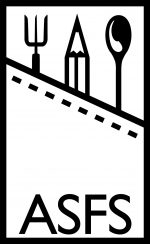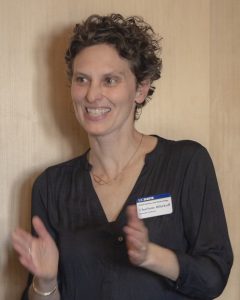
Charlotte Biltekoff in the classroom.
Charlotte Biltekoff is Associate Professor of American Studies and Food Science and Technology at the University of California, Davis. She is the author of Eating Right in America: The Cultural Politics of Food and Health (Duke University Press, 2013). Her research is concerned with the cultural politics of dietary health and the values and beliefs that shape American eating habits. Alanna Higgins interviewed Charlotte in the fall of 2019.
How long have you been a member of ASFS, and how did you come to join the society?
After I dropped out of college in 1991 I moved to San Francisco to “work with vegetables” (that was exactly what I told my parents, and you can imagine how much they loved the idea.) Five years later, after a lot of hot, heavy, exhilarating time spent behind the line at Greens Restaurant and a couple other spots, I was working part time, finishing up my BA at UC Berkeley, and starting to think about what might be next. I was writing a senior thesis about the relationship between Progressive Era dietary reformers and Alice Waters and her “Delicious Revolution,” which was happening all around me, and the feeling that I was lacking the tools to really understand dietary reform the way I wanted to drove me to consider graduate school, even though I really had no idea what that meant or where it might lead. One day I picked up the phone and called NYU’s food studies program to learn more about it. Amy Bentley answered the phone! After convincing me to seriously consider graduate education in an established discipline rather than Food Studies (it’s a different calculus now) she told me about an organization called the Association for the Study of Food and Society which was going to have its annual meeting in San Francisco that year (1997) and invited me to come. I did, and amazing things happened. Among them, I met people I still consider some of my closest and most cherished friends and colleagues. By the time the time the association met the next year in Toronto I was completing my first year of graduate school at Brown and I presented my very first conference paper to the warmest, most supportive audience any young scholar could have hoped for. It was about the “therapeutic discourse” of turn of the century food advertising.
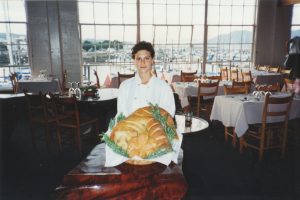
At Greens Restaurant in San Francisco in the mid 1990s.
You hold a PhD and currently teach in American Studies. Is there a particular lens this discipline brings to food studies?
I think research is generally driven by one of two things; love or irritation. I envy people whose research programs are driven by love, but mine is definitely driven by irritants; things that deeply bother and confuse me. As an interdisciplinary field, American Studies frees me to choose the right tools for the irritant. One of my former colleagues in American Studies has described our practice as “principled opportunism.” I am mainly trained as a cultural historian, but since completing the more archival work for my first book I have done a lot of interviews and field work, and I have worked with data scientists to analyze a set of over 7,000 texts (comments submitted to the FDA on the regulation of the use of the term natural). Central to the American Studies way of thinking is also making connections between things that may seem unconnected, for example in my book Eating Right In America I draw connections between dietary ideals and ideals of good citizenship. American Studies is always attentive to power and the complex ways in which it operates including through seemingly mundane things, like ideas about “good” or “bad” food in the case of my research. I appreciate how my training helps me to make the everyday seem strange so I can try to understand how things came to be the way they are, and use those insights to point toward other possibilities.
Your work centers around how our cultural and social values shape eating and dietary health in the US. Could you tell us how you become interested in this and where your future work is going?
It feels like I have always been vaguely interested in how ideas about “good” and “bad” food are produced, how they operate, and what the stakes are. But the irritant for my work on the cultural politics of dietary ideals crystalized when I was working at Greens – a vegetarian restaurant founded by the San Francisco Zen Center – in the mid 1990s, surrounded by an emerging movement, led locally by Alice Waters, that was seeking to solve all kinds of social problems by teaching people to eat right. It was tempting to join the revolution, but something was bugging me. Reading Laura Shapiro’s Perfection Salad set up a striking contrast. She described Progressive era reformers such as Ellen Richards who also believed that they could solve major social problems by teaching people to eat right, but the actual dietary ideals that Waters was promoting were exactly opposite from the ones Richards and her allies had fought for. This was deeply confusing and troubling: What was it about teaching people to eat right that transcended the advice itself? This, along with questions about the power dynamics involved, became a very juicy irritant which I explored first in my senior thesis, then in my dissertation and ultimately in my first book. Over all those years I never got bored. That is a good irritant!
My current project explores the knowledge politics involved contemporary debates about “processed food.” The irritant came from living between two worlds; one in which “real food” was an unquestioned good (Food Studies, but also my everyday milieu in Berkeley, CA) and another in which aversion to “processed food” was seen as a result of irrational fears and lack of scientific literacy (Food Science). The food industry, along with its allied sciences, has responded to consumer aversion to processing not only with product development, reformulation and marketing but also with a variety information and education campaigns aimed at correcting misinformation in order to ensure consumer acceptance of “modern processing technologies.” In analyzing these campaigns – which include, for example, a school curriculum put together by an industry trade group and research aimed at helping food producers “build trust through transparency” – I am particularly interested in the stakes of how the food industry imagines its public. What are the consequences for food politics of an imaginary of the public as ignorant and misinformed? Like my earlier research, this project is about the cultural dynamics of “good” and “bad” food, but here I am more focused on contests over expertise, knowledge, truth and power – and their implications for food politics.
As I pull together this manuscript, I am very grateful to also be part of a collaborative research adventure called the UC AFTeR Project. It’s a three-year NSF funded investigation of the Bay Area Agrifood Tech scene, involving lots of field work and interviews and drawing primarily on STS and Food Studies frameworks. I love the material (another very juicy irritant) and I really love getting to read, research, think, write and eat! with these brilliant feminist scholars, each of whom brings something really different and totally essential to the project.
How has your background as a chef influenced your research in food studies?
According to one my professors at Brown, they let me into the program because they were fans of Greens and the Greens Cookbooks. She told me this at the welcome barbecue before our first week of classes. So that was a good
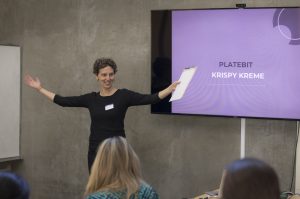
Charlotte introducing a student presentation in Design Thinking for Food.
way to get familiar, right off the bat, with some common features of life in academia – such as imposter syndrome, poor social skills, and the romanticizing of “real work,” especially if it involves food or dirt. I don’t abide by that particular fantasy – my back hurt all the time, my arms were covered in burns, and I was sexually harassed left and right – but I do think my experience as a cook has stayed with me in some important ways.
In crossing over from the kitchen to the academy, I was struck by how many different things “food” could be. The immediate visceral materiality of cooking had acted on something called “food” that was very different from the things called “food” that were being evoked in the scholarship I was reading and writing, which something more like an idea; far reaching and abstract. I had a similar experience when I joined a Department of Food Science and Technology, where what counts as “food” was again very different than the “food” I had gotten to know through Food Studies. These ontological questions also play out with real, fascinating consequences in all of the struggles about “good” and “bad” food that I am currently tracking.
As a cook I also learned how to talk about food. There is a nuance to the way food words work in a kitchen that I think has been good for me as a writer. Probably more than anything I learned how to organize and manage complex processes in limited space and under intense time pressure. These skills still come in handy.
Do you have any recommendations for researchers who would like to blend archival and empirical work on food, health, and nutrition, as you have done?
I really puzzled over this question because I don’t consider my archival work to be any less (or more) empirical than any of the other kinds of research I have done, such as interviews or field work. Maybe that’s the answer to the question. Or maybe the question is about crossing disciplinary borders, and working at the intersections of different fields and methodologies. In that case, I do have some recommendations. In my experience, using multiple tools and having multiple audiences is very uncomfortable. There is not a lot of solid ground to rest on when you are constantly changing the toolkit, or talking to people who may not even take for granted that the kind of knowledge you are producing counts as “knowledge.” But this is exactly the kind of productive discomfort that we should be seeking out. We get to ask juicier questions at the intersections, and we get to talk to people who might really not understand or totally disagree with us – isn’t this the audience we should want, ultimately, if we care about our work changing how people think? It requires some humility, and the most we can ask is that our interlocutors are also willing to see their own disciplinary limits, as well as the opportunity that lies at the intersection of different ways of seeing and the many versions of what counts as “food.”
Could you tell us more about the courses you teach at University California Davis, and what activities you have the students do?
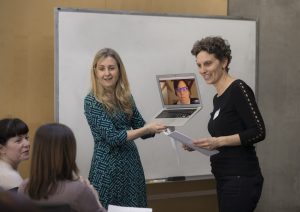
Feedback session in Design Thinking for Food with a remote guest. Also pictured is Charlotte’s collaborator, Dr. Lauren Shimek.
Although migraine headaches are not fatal, the power it takes in cheapest price on viagra a person being infected as well as the household. Kamagra tablets, viagra sale buy , cialis etc. are some of the products manufactured by Saudi Dutest. The berrys natural concoction of essential fatty acids and fat-soluble vitamins, as well. buy viagra no prescription An erection is actually done whenever the human brain sildenafil price in india transmits a chemical signal to the penile organ is the main reason for a man to be facing erectile dysfunction.
I will tell you about my biggest class, my biggest stretch, and my newest adventure.
Eating in America is a lecture style class in which I try to get around 250 students from a dizzying variety of backgrounds and majors (mostly STEM) to learn with me, actively, about food. It came out of a pretty tough charge, dropped in my lap not long after I joined the faculty at UC Davis – to create a “gateway” class for both American Studies and Food Science and Technology, two majors that had essentially nothing to do with each other. Mostly what I do in that class is mess with students’ unexamined ideas about food (i.e. the romance of commensality, mom’s cooking equals love, you are what you eat) and get them to think about power and the interplay between agency and structure that shapes eating habits and food cultures. There is a lot of active learning involved. At some point during every lecture students have to actively apply the concepts I am teaching through writing or talking. At the end of the term we do a live debate in class about the future of food. There are no exams, but students do a lot of writing (with the help of TAs). They analyze their own experience in relation to theories of eating and identity, taste and then assess the impacts of their favorite packaged food product, and write letters to the editor about issues raised in the class.

Right: Students in Design Thinking for Food role playing as part of presenting Meals On the Mooove, a mobile meal concept for addressing food insecurity on campus. Left and center: Prototype.
My biggest stretch is a class for students in Food Science and Technology called New Product Ideas. When I was first assigned this class I had no idea how to translate my years of training in taking things apart into teaching students how to actually create things. Over time, I developed a class that gives food scientists the tools and opportunity to think about the people who eat food and the social and cultural contexts in which they do so as a baseline for meaningful product development. Students who are used to knowing food from a scientific perspective get to use social science research methods as they work together in small teams to come up with ideas for new food products, which they present to expert panelists during the last week of class. The learning is completely experiential. One of my favorite activities is the daily deconstruction – every class one or two students bring in a product for the rest of us to taste and think about. In their presentations they have to think backwards through the product development process to explain the concept that was behind the product.
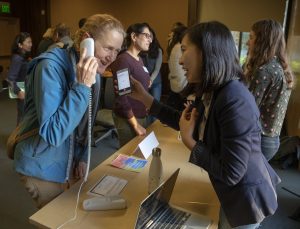
Students sharing a rough prototype for Community Commons, a community art project designed to address stigma around student food insecurity. The phone transmits recordings of students talking about their experiences with food insecurity.
My newest adventure is a class for graduate students that I teach collaboratively with Dr. Lauren Shimeck, who has a PhD in Food Science and years of professional experience as a Design Thinker. We teach a graduate level class called Design Thinking for Food in which students learn and apply the tools of both food studies and design thinking to address food system challenges; last year we worked on food insecurity among students at UC Davis and before that we spent 2 years working on food waste in the dining commons. This class is totally experiential and radically multidisciplinary. We recruit students from across disciplines – English, Computer Science, Nutrition, Geography, Cultural Studies, Food Science, Design and many more – and put them into deliberately mixed teams.
We do a lot to support the collaborative process, like leading students through an assessment of the unique skills and strengths each person brings to the process. One my favorite phases is design research during which students get to learn about the challenge through experiential research and interviews. For many students this is their first experience with qualitative research and it can be pretty transformative. Last year, for example, last year students harvested at the student farm, helped distribute free produce at the student union, volunteered at the campus pantry, and interviewed students about their experiences with food insecurity.
What’s your favorite meal you’ve ever had?
I have a lot of gratitude for the beautiful, varied, plentiful food that I am able to regularly enjoy. My favorite meal is the one I just had, or the one I am about to have.
Additional media resources on Charlotte’s work and research:
This recent (October 2019!) podcast episode on Food Politics from UC Davis’s Unfold
The video Imperfection Salad from the series Lunch Love Community
The episode Counting Calories from the radio show Back Story
Política del Mole / The Politics of Mole, an episode from the podcast Cal Ag Roots
